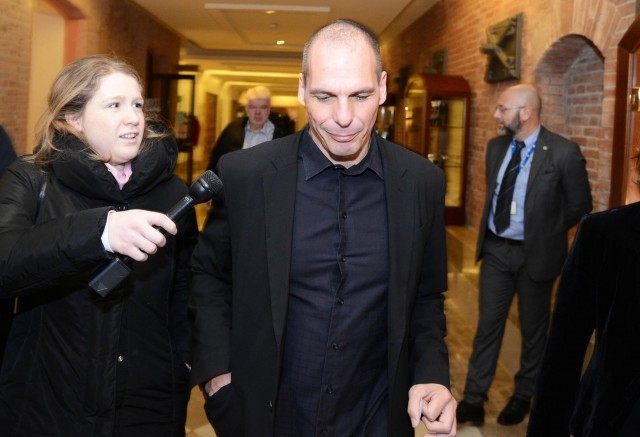ATHENS, Greece (AP) — Of all seven reform proposals submitted by Greece to eurozone finance ministers, Reform No. 3 has been most talked about since it was leaked.
It calls for “non-professional inspectors,” including “students, housekeepers and even tourists” to crack down on tax evasion.
The proposal, which has earned the government wide scorn from political opponents and on the Internet, is described in an attachment to a letter sent by Finance Minister Yanis Varoufakis to Dutch counterpart Jeroen Dijsselbloem, who is also president of the Eurogroup — the gathering of the 19 eurozone finance ministers.
The inspectors are to be “hired on a strictly short-term, casual basis (no longer than two months, and without any prospect of being rehired) to pose, after some basic training, as customers, on behalf of the tax authorities, while ‘wired’ for sound and video.” They wouldn’t have the authority to challenge offenders, but their recordings would be used by tax authorities “that will use the collected evidence immediately to issue penalties and sanctions.”
“The very ‘news’ that thousands of casual ‘onlookers’ are everywhere … has the capacity to shift attitudes very quickly, spreading a sense of justice across society and engendering a new tax compliance culture,” Varoufakis concludes optimistically in the letter that was leaked late Friday.
Besides the obvious legal reasons arising from “wired” inspectors — and Greece has pretty strong laws against the admissibility of such evidence — the whole experiment would confront a very strong “anti-snitching” culture ingrained in Greek society.
Opposition parties New Democracy and PASOK, the coalition partners in the previous government, were quick to blast the proposal as “ridiculous” and legally dubious.
“If they expect to combat tax evasion this way, they are not only dangerous, since they do not grasp the legal ramifications of the measure, or its effectiveness, but are also ridiculous and expose the country to ridicule,” New Democracy spokesman Costas Karagounis said.
The government hasn’t confirmed the leaked contents of the letter, but didn’t deny them either when replying to New Democracy.
“They who have repeatedly ridiculed the country to the world by serving all sorts of interests … should better keep silent. They have already been disavowed by society. The government will do everything to eliminate tax-dodging opportunities opened by previous governments. The results will show who is ridiculous and who is not.”
The reform proposals will be discussed at a Eurogroup session in Brussels on Monday.
The new Greek government insists that they are only looking for a new loan agreement, uncoupled from the fiscal adjustment demands and reforms stated in a “memorandum of understanding” between Greece and its creditors. The other Europeans see the two agreements as interchangeable, with the memorandum having no expiration date and its successful completion the prerequisite for new funding. To them, Greece is just playing with semantics for the benefit of a domestic audience.
Varoufakis’ letter to Dijsselbloem acknowledges that a new agreement will have to be made.
“The Greek government believes that, very soon, the two sides ought to begin … discussions regarding a ‘possible follow-up arrangement’ … Please also note that the Greek government would like any ‘follow-up arrangement’ to take the form of a ‘contract for Recovery and Growth of the Greek Economy.”
Prime Minister Alexis Tsipras also acknowledged that Greece “is in need of financing.” In an interview with German magazine Der Spiegel published Saturday, he said Greece “needs a safety net” until it can fund itself from capital markets. But, he insisted that, “I wouldn’t call it a bailout … (It) can’t be linked to a program that led us into a social emergency, but to one that achieves growth.”
Tsipras did acknowledge that the austerity budgets of previous governments have allowed Greece to “have primary surpluses rather than deficits.”

COMMENTS
Please let us know if you're having issues with commenting.